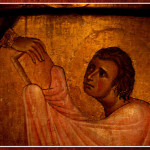We run our website the way we wished the whole internet worked: we provide high quality original content with no ads. We are funded solely by your direct support. Please consider supporting this project.

What Jesus Revealed About Being Human
According to the creation story, when Adam and Eve ate the fruit, they essentially ceased being the wonderful, God-centered, God-dependent human beings the Creator intended them to be. They became less than fully human. Instead, they began using everything and everyone in the world as surrogate gods, trying to get from people, deeds, and things what only God can give for free.
The solution to this problem is Jesus Christ. Just as Jesus uncovers the truth of the real nature of God, over against the serpent’s lie about God, Jesus uncovers the truth about what it means to be fully human. He reveals the truth about us. In revealing the true God, Christ reveals the true human.
When Christ uncovered the God of unsurpassable love, he uncovered humanity as the object of God’s unsurpassable love.
This is one of the reasons “the Word became flesh” (John 1:14). In the words of the Chalcedonian creed, the Son of God is “fully God and fully man.” God reveals humanity in the very act of revealing deity. Jesus is said to be the image of God both as perfect human and as the perfect expression of God (1 Cor 15:49; 2 Cor 3:18; 4:4; Col 1:15). Christ is both God before us as well as us before God.
Just as all we need to know about God is found in Christ, so too all we need to know about humanity is found in Jesus Christ.
Jesus is who God always intended humanity to be and who humanity truly is—if only we will yield to God’s Spirit and relinquish the illusions of the serpent’s lies about who God is and who we are.
What Christ reveals about humanity is just as unexpected as what he reveals about God. Nothing about Christ fits easily with our ordinary, fallen preconceptions, for they are polluted with the serpent’s lie. Let’s briefly consider two basic things that Christ uncovers:
- By dying on the cross for us, Christ revealed the depth of human sinfulness. Christ reveals that our false humanity is overcome by illness. The seriousness of an illness can be assessed by how radical the cure is that is required to overcome it. Only when we look at the cross, God’s cure for our sin, can we see the full gravity of our condition. If God had to go to the furthest extreme imaginable to save us—the cross—then our situation must have indeed been desperate.
- The same act that exposes our hopelessness before God uncovers our hopefulness in God. The cross reveals the unsurpassable worth we, in our humanity, are mercifully given by God. The very act that exposes the horror of human rejection of God reveals the beauty of God’s acceptance of humanity. In the act of exposing the sickness of humanity, God brings the cure.
In bearing our sin on the cross, Christ revealed the truth about God—that is his unfathomable love—and the truth about us—that our sin is damnable and that we are nonetheless loved, forgiven, and reconciled to God. Through this, we become recipients of and participants in God’s eternal, perfect love. “In Christ,” what it means to be human is redefined.
—Adapted from Repenting of Religion, pages 149-155
Photo credit: TheAlieness GiselaGiardino²³ via Visualhunt / CC BY-SA
Related Reading

Part 3: Disarming Flood’s Inadequate Conception of Biblical Authority
Image by Ex-InTransit via Flickr In this third part of my review of Derek Flood’s Disarming Scripture I will offer a critique of his redefined conception of biblical inspiration and authority. I will begin by having us recall from Part I that Flood holds up “faithful questioning” over “unquestioning obedience” as the kind of faith that Jesus…

The Image of Cross-Like Love: God’s Self-Portrait, Part 6
In the previous blog I argued that God is cross-like love. In this blog I’d like to take this a step further by demonstrating why the cross alone could function as the definitive revelation of God’s true character and by showing how this revelation weaves together everything Jesus was about. If you want to know…

The Nature of Temptation
How does temptation work? Based on James 1:13-16, Greg unpacks the way that desire can give birth to sin. But desire is actually rooted in our longing for God, and the desire itself—and therefore the temptation itself—is not in and of itself a sin. God created us with a “hungry heart” so that he could…

God as Covenant Keeper
Covenant lies at the heart of the biblical understand of God’s relationship to the world. Simply put, a covenant stands in contrast to a contract where parties enter into a quid pro quo arrangement. With a contract an agreement is made to protect oneself. With a covenant, one commits oneself with promises to another for…

What God Requires
The reason we were created and what we are called to be is summed up in one word: love. The central defining truth of those who follow Jesus is that in Christ God ascribed unsurpassable worth to us, and thus the central defining mark of those who live in love is that they ascribe the…

Why Bart Ehrman Doesn’t Have to Ruin Your Christmas (Or Your Faith) Part 6
This is the sixth of several videos Greg put together to refute Bart Ehrman’s claims published in the article What Do We Really Know About Jesus? In this segment, Greg addresses the apparent discrepancies in the genealogies of Luke and Matthew and the implausibility of the idea that they were simply fabricated. We’ve been hearing that people are using…
